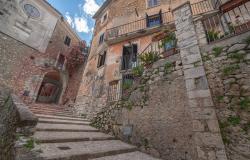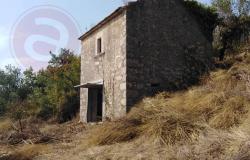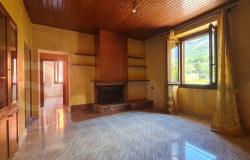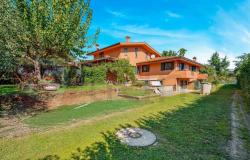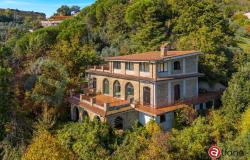LOOK FOR ANOTHER AGENT
Submitted by Gala Placidia on Wed, 05/27/2009 - 17:21In reply to A newbie all over again! by Annec
Elliven, the opinion of just one agent is not enough. I have met some excellent agents and some who would not have a clue of what they were supposed to be doing. Aim for all the markets, both Italian and international ones. The British are not the only people buying Italian property.
In reply to LOOK FOR ANOTHER AGENT by Gala Placidia
AGENTS
Submitted by Anonymous (not verified) on Wed, 05/27/2009 - 17:56In reply to A newbie all over again! by Annec
As ever GP is quite right. Initially in Italy we were with an English agent who showed us things she thought English people would like (be conned into?). Then we found an Italian agent who showed us everything anyone Italian, English, Dutch, Fijian etcetc would like. Houses are not just for one market. Spread your commercial wings .
.
Could be because of the
Submitted by Capo Boi on Wed, 05/27/2009 - 19:14In reply to A newbie all over again! by Annec
REDUCTIONS IN PRICES AND MARKETS
Submitted by Gala Placidia on Thu, 05/28/2009 - 04:59In reply to A newbie all over again! by Annec
It is quite possible that the UK market is in a bit of a "wait and see" situation because of the falling value of the pound; however, potential buyers in the euro zone are looking around. I do not think that prices have gone down in Italy in all regions; perhaps, prices were artificially inflated in some areas because of the big demand, and these are the ones that are going to suffer. Eliven, your house will also appeal to the Italian buyer from Rome who wants to buy a secondary residence in the country. For this reason, market the house through several agents who have a broad clientele.
italian property
Submitted by Valentina+c on Thu, 05/28/2009 - 05:11In reply to A newbie all over again! by Annec
Of course an advice from people with a direct experience would be more helpful, but maybe this section of italymag should be of help for those you are interested in the property market: www.italymag.co.uk/italy/property
I am a UK agent and I don't think that's true
Submitted by elicat on Thu, 05/28/2009 - 08:12In reply to A newbie all over again! by Annec
Hi there. I'm a licensed Italian agent working for a UK agency that handles a lot of property in northern Lazio. I can tell you that whatever UK agent said that to you is off base. Yes, the market for ruins has slowed down because housing prices have come down around 20% - this often means that it's a better deal to buy an already restored property than to spend the money to restore a ruin. Building costs have stayed the same - so you do the math. However, this does not mean that nobody is buying ruins anymore. And a really important thing to remember (sorry guys!) that UK buyers are not the only foreign buyers! We sell to lots of Americans, some Germans and Dutch, Australians and the occasional Russian. So, my general advice to you would be to list with two agents, one local Italian who works a lot in your area, and one international - meaning one of the big UK firms doing business in Italy and not an independent who happens to be English.The market is slow, you won't sell in a hurry, but if you price your property realistically and it is as nice as you say, you will eventually sell it.Good luck!
I completely agree with you
Submitted by Capo Boi on Thu, 05/28/2009 - 15:54In reply to A newbie all over again! by Annec
I completely agree with you elicat and while your figure of a 20% fall in prices may be unappealing to many you could well be right. I follow the market quite closely and many properties are now cheaper than they were 5 years ago. No region in Italy imo. has escaped.
THE PRICE OF SOME RUINS
Submitted by Gala Placidia on Thu, 05/28/2009 - 18:31In reply to A newbie all over again! by Annec
Elicat, don't you think that some ruins were grossly overpriced? By the time the new owners paid not only for the ruin but also for all the renovations, they had a nice white elephant which had cost a fortune. I am not in the real estate industry, but it took us two years to find the home we wanted at the price we were prepared to pay, and this was before the start of the crisis. We saw many houses in a variety of locations, most of them at ridiculous prices. The property we bought was overpriced, but we simply made an offer 25% less than the asking price and the seller, following advice from his geometra, accepted it. The negotiated price was the real value of the property.I agree that perhaps the market may be a bit slow if you are trying to sell in a hurry; however, if you paid the right price and spent the right amount of money restoring or improving the property, I do not think that you will loose money.One of the big problems has been that many people have purchased ruins without fully understanding how much it was going to cost them to restore the buildings. And some agents have given purchasers the wrong advice regarding the final cost of the restoration.
Ruins
Submitted by Anonymous (not verified) on Thu, 05/28/2009 - 18:46In reply to THE PRICE OF SOME RUINS by Gala Placidia
Listen to GP - she talks a lot of sense . We bought a ruin and our building costs were a mere 50% over budget. We know people whose building costs overran by 400%
. We bought a ruin and our building costs were a mere 50% over budget. We know people whose building costs overran by 400% . On the other hand it is said that 'every € you spend on laying bricks adds €2 to the value of the house'. We're told that our property is now worth twice what we spent on it - not that we're selling (and I'm not sure I totally believe them either!). Basically, I believe, your head must rule your heart
. On the other hand it is said that 'every € you spend on laying bricks adds €2 to the value of the house'. We're told that our property is now worth twice what we spent on it - not that we're selling (and I'm not sure I totally believe them either!). Basically, I believe, your head must rule your heart . If you want to buy your dream ruin in the middle of nowhere with no utilities, no access, no view and no community by all means do so. But never think that because it's your dream anyone else will eventually want to buy it from you. But then living in Italy is sooooooo wonderful.................................
. If you want to buy your dream ruin in the middle of nowhere with no utilities, no access, no view and no community by all means do so. But never think that because it's your dream anyone else will eventually want to buy it from you. But then living in Italy is sooooooo wonderful.................................
Difference between asking price and selling price
Submitted by elicat on Fri, 05/29/2009 - 04:43In reply to THE PRICE OF SOME RUINS by Gala Placidia
GP - your experience is par for the course. Most properties in Italy are "overpriced" in that the asking price is what the seller thinks it is worth (or what he needs to realize for another reason... a child getting married, another property to fix up, etc.) and not what the market would price it at. This applies to ruins as well as restored properties. The typical Italian seller "doesnt' have to sell" and is willing to wait for the right buyer to come along at the asking price. Those who "just want to be done with it" (e.g. have to sell) almost always end up accepting something closer to the market price for the property - that is if the buyer is well informed. The "three D's" of property definitely apply when looking to buy - Death, Divorce and Debts. If you can find a seller with one of those three problems you can usually get a fair deal.That said, in a good market where demand exceeds supply people will pay more. In a soft market like we have now sellers have lowered their asking prices to the actual market price, and some are accepting offers below that. Hence we can see that for the past several years asking prices were inflated on average 20% over market price.As I stated earlier, building costs have remained stable, so at present many buyers are looking for already restored properties in a classic case of head ruling heart. For argument's sake, a ruin priced at €100,000 today plus another €100,000 for restoration equals total costs of €200,000. The same ruin purchased two years ago at €120,000 and restored for another €100,000 cost the seller €220,000, but today the buyer could get it for €190-200,000 and move right in. The lesson is, don't be put off by asking prices. Look at properties of your target type and then take the initiative to find out what the real market price would be and make an offer close to that. If you have a good agent, he or she will do this for you. If you don't, well, change agents.As several people pointed out, if your heart is set on restoring a ruin, be prudent, don't overpay and take the time to talk to your geometra/builder's references. You often have to act as your own general contractor, as this is a figure that doesn't exist in Italy, however it is well worth your while to get out your green eyeshade and develop a reputation for being a cost hawk early on in the process. In the southern Umbria region I can recommend highly the only GC I know in Italy - a half American half Italian who has restored many a ruin for foriegn buyers, to their great satisfaction - Riccardo Caracciolo. Be very leery of estate agencies, particularly run by Englishmen, who sell you restoration services. The typical skim off the top on these projects is close to 50%! You would be much, much better off with local Italian geometra and architects - their skim is considerably less!After running on for so long I hope this is useful to someone!
EXCELLENT ADVICE
Submitted by Gala Placidia on Fri, 05/29/2009 - 07:30In reply to A newbie all over again! by Annec
This is excellent advice, Elicat, particularly for those wishing to buy a property right now. It should be kept as a reference. In our case, we knew we had a winning hand. We had the cash available and my husband is a retired architect, plus we have plenty of experience buying properties. Between my husband and the geometra, we convinced the owner, who needed the cash, that we were paying a fair price. And that is what it was, a fair price. I agree that many sellers have unrealistic expectations regarding their properties. For this reason, some of the ones we inspected are still in the market.... at a reduced price. Both buyers and sellers need reliable and realistic advice from estate agents and professionals.
DEATH, DIVORCE & DEBTS
Submitted by Anonymous (not verified) on Fri, 05/29/2009 - 14:43In reply to A newbie all over again! by Annec
It was the 'death' bit that caused us problems because, as I understand it, on death the estate is divided among the children (who then may not agree on what happens next). We were offered a large house with 'vacant possession' by an English estate agent only to find that 2 rooms (with their own outside access) were actually being retained by one of the children! 
Well obviously the heirs need all to want to sell!
Submitted by elicat on Sat, 05/30/2009 - 01:56In reply to DEATH, DIVORCE & DEBTS by Anonymous (not verified)
You're correct in pointing out that this is by no means always the case, but if the heirs are in agreement to sell it can generally be quick and painless. They ususally just want to get their share of the cash.I believe the legal term you were quoted was "libera di persone e cose" - which the property in question most clearly was not!
I have some sympathy with
Submitted by Ram on Sat, 05/30/2009 - 03:11In reply to A newbie all over again! by Annec
I have some sympathy with the Italian agent - there is an assumption that most Brits want the 'dream' and to restore a pile of stones - and in fact it is true - most clients want that - but not all. I have very rarely said to a prospective vendor that his house is unsellable - its just finding the right buyer. As far as market price goes - its like banging your head against a wall. Most Italians (gross over generalisation to follow) dont understand macro economics. They see the neighbours house on the market for 100.000 and because their house is nicer (its always the case) it must be worth more. So the requests continue to climb. I have tried explaining countless times to clients that market prices is what is paid for a property not what is requested. If they bothered to find ut what was actually paid for the ruin next door, perhaps their expectations would be lower!
In reply to I have some sympathy with by Ram
I am puzzled
Submitted by Serge on Mon, 06/15/2009 - 00:27In reply to A newbie all over again! by Annec
Perhaps somebody could explain. Why foreigners buy the ruins and live in glorious isolation and Italians buy or build modern houses (including stone villas) and flats near and in towns and villages. Italians in Tuscany used to buy the ruins to create agriturismos. Lots of grant money were available then for that purpose!This in an extract from an article I found in http://www.buy-italy-property.com/news/ Italy’s appeal is changing Interest for Lazio, Puglia and Abruzzo increased between 2003 and 2007. Castiglia Masella"Scenari Immobiliari estimates that foreign buyers purchased 3100 second homes in Italy in 2007 – 8% of the segment – for an investment of over 1,1 billion euros: nearly twice as much as in 2003.Lazio has become the most popular destination attracting 25% of the investments against the 20% of Tuscany. Umbria with its 10% has held its position for the last two years. It is boom time for Puglia and Marche: the former passes from 3% of 2003 to 12% and the latter from 2 to 11%. Meanwhile, Abruzzo advances transforming its 1% of five years ago to 6%.The foreigner buying in Italy prefers stone houses, charming old properties and country houses - also in need of renovation – with an average budget of 370,000 euros and not rarely even over a million. In Lazio, after the province of Viterbo, the areas of Rieti and Ciociaria are also becoming popular."
Italian friends think it must
Submitted by Angie and Robert on Mon, 06/15/2009 - 04:19In reply to A newbie all over again! by Annec
Italian friends think it must be lonely living down our white road, too far away to shout good morning to us, but we prefer to live out of the village in our old and draughty farmhouse. They prefer to be amid the bustle of village life , some in their posh convenient apartments, easy to clean, easy to heat, neighbours all around them. This also applies to other areas of their life, in a large restaurant they all prefer to huddle together, public benches are close together and face each other, to facilitate a nice chat. I think us from colder climes are just coded to find our own space.A
property market
Submitted by Valentina+c on Mon, 06/15/2009 - 08:10In reply to A newbie all over again! by Annec
Find here another property market study by Carla Passinowww.italymag.co.uk/italy-featured/property/tuscany-tops-most-popular-and-most-expensive-lists









